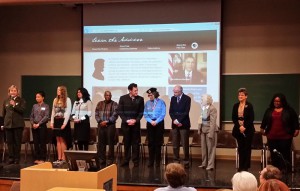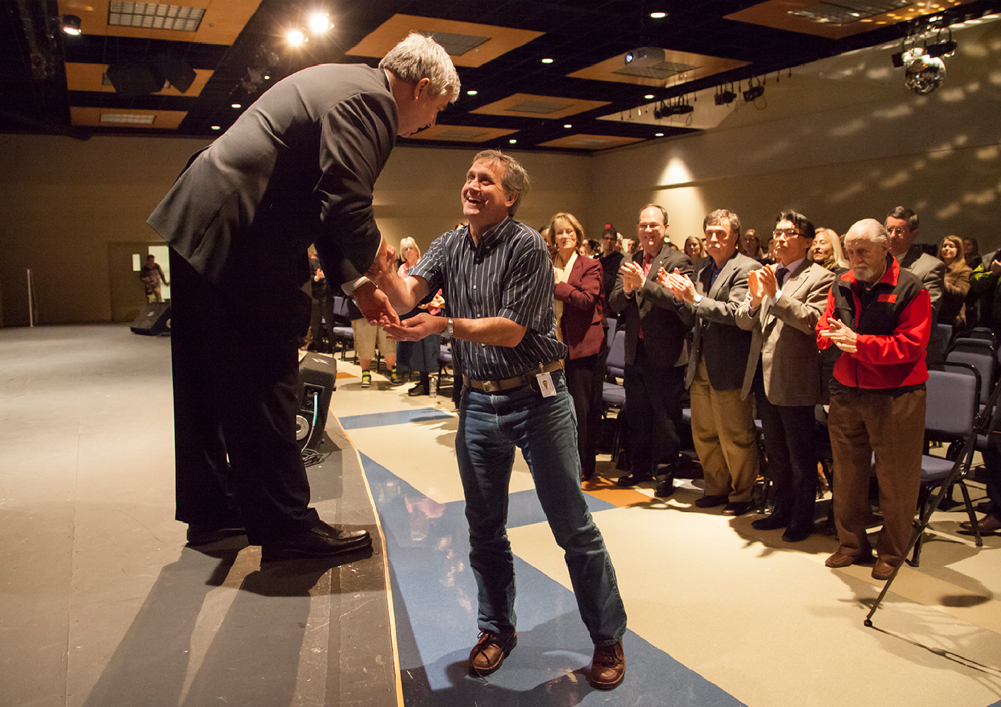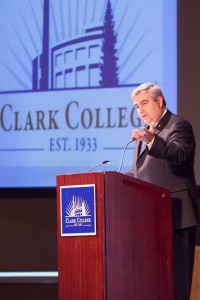History Lesson

Readers of the Gettysburg Address were, left to right, Tracy Fortmann, Rowena Tchao, Claire Bauer, Rosalba Pitkin, Bill Charles, Tim Leavitt, Julie Eddings, Bill Ritchie, Pat Jollota, Lisa Gibert, and Sirius Bonner.
Four score and five people attended a recitation of the Gettysburg Address on November 19, the 150th anniversary of that famous speech’s delivery by President Abraham Lincoln. The event, which was organized jointly by Clark College Mature Learning and the National Park Service’s Fort Vancouver National Historic Site (FVNHS), took place in Foster Auditorium.
The event was part of the Learn the Address project, an effort by documentarian Ken Burns, along with numerous partners, to encourage Americans to video record themselves reading or reciting the address.
Eleven different presenters recited lines of the speech: Vancouver Mayor and Clark alumnus Tim Leavitt, Clark College Foundation President and CEO Lisa Gibert, Clark College Assistant Vice President of Corporate & Continuing Education Kevin Kussman, Fort Vancouver Superintendent Tracy Fortmann, Clark College Special Advisor for Diversity & Equity Sirius Bonner, Skyridge Middle School student Claire Bauer, Mature Learning student Bill Charles, Northwest Indian Veterans Association Color Guard member Julie Eddings, Crossroads Community Church pastor Bill Ritchie, Clark College Diversity Outreach Specialist Rosalba Pitkin, Clark College Foundation Annual Fund Specialist Rowena Tchao, and Clark College Mature Learning instructor and Clark County Freeholder Pat Jollota.
The program also included period Civil War music by “Illinois” Doug Tracy; a presentation of the colors by the Northwest Indian Veterans Association Color Guard; lecture on Lincoln by Mature Learning instructor Dr. Elliott Trommald; a lecture on Fort Vancouver’s role in the Civil War by Tracy Fortmann; a welcome by Clark College Vice President of Administration Bob Williamson; and the reading of a Walt Whitman poem by Clark College Trustee Royce Pollard.
“This program is one of several this year that we are doing in a partnership we have inaugurated with the National Park Service and Fort Vancouver National Historic Site,” said Mature Learning Manager Tracy Reilly Kelly, who emceed the event. “Our co-programming will focus on history and archaeology.”
Reilly Kelly added that FVNHS staff had told her that they appreciated that Clark College President Bob Knight made it back from China just in time to attend that evening’s launch of the Fort’s new exhibit, “The Civil War in the West: A New Birth of Freedom.”
Story submitted by Tracy Reilly Kelly
Photo: Clark College Mature Learning/Don Gardener

